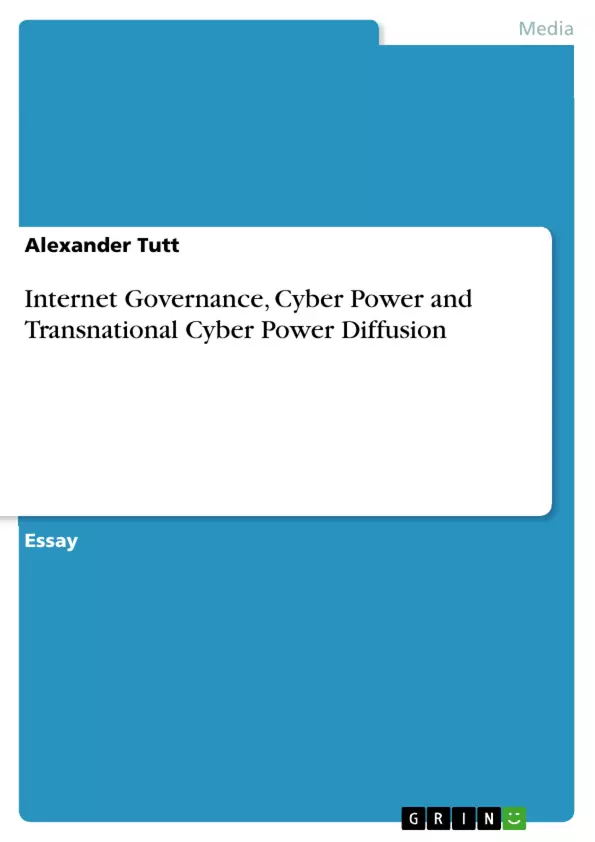During the last two decades, a revolution of the Internet has been witnessed, leading to significant changes in our society. These changes, especially regarding availability and dissemination of information, are well comparable to Johannes von Gutenberg’s invention of the letterpress in the fifteenth century. The governance and maintenance of the Internet asks for considerable efforts by powerful state actors, notably the United States of America. However, the degree of Internet-usage is marked by a power-shift from state to non-state actors. Regarding this issue, during an IBEI-lecture about “Communication and Education in International Relations”, César de Prado used the term ‘Transnational Cyber Power Diffusion’ (De Prado, 2013), inspired by Joseph Nye’s (2010) concept of ‘Cyber Power’.
This paper seeks to explain who is in charge of Internet governance, how power within cyberspace is wielded, and what it may mean for future developments. In order to achieve this, the structure of this paper is fourfold. First of all, a short introduction is given, outlining the history of the Internet’s creation. Afterwards, the matter of Internet governance is dealt with, connecting it to several aspects of Joseph Nye’s Cyber Power concept. In a third step, a case study is presented, examining two relevant non-state actors, –Wikileaks and Anonymous–, aiming at systematically fitting them into context. Finally, the findings are summarized, analyzed and framed into an application of the concept of ‘Transnational Cyber Power Diffusion’.
Inhaltsverzeichnis (Table of Contents)
- Introduction: The creation of the Internet
- Internet governance
- Cyber Power and Internet Governance
- Wikileaks, Cyber Power, and Internet Governance
Zielsetzung und Themenschwerpunkte (Objectives and Key Themes)
This paper examines the governance of the internet, analyzing how power is exercised within cyberspace and the potential implications for future developments. It seeks to understand who is in charge of Internet governance and whose interests are served.
- The historical development of the Internet and its connection to US military and governmental initiatives.
- The different dimensions of Internet governance, including technical and policy aspects.
- Joseph Nye's concept of 'Cyber Power' and its application in the context of the Internet.
- The influence of non-state actors, specifically Wikileaks and Anonymous, on Internet governance and cyber power.
- The concept of 'Transnational Cyber Power Diffusion' and its relevance in understanding power dynamics within cyberspace.
Zusammenfassung der Kapitel (Chapter Summaries)
- Introduction: The creation of the Internet: This chapter traces the origins of the Internet back to the US Department of Defense's need for a decentralized communication system in the wake of the Cuban Missile Crisis. It outlines the evolution of the Internet from a military research network to a commercial network, highlighting the role of various US governmental agencies in its development.
- Internet governance: This chapter explores the complex and multi-faceted nature of Internet governance, drawing on the definition provided by the Working Group of Internet Governance (WGIG). It discusses different dimensions of Internet control, including access, functionality, and activity, and examines the role of ICANN and its critics.
- Cyber Power and Internet Governance: This chapter introduces Joseph Nye's concept of 'Cyber Power', defining it as the ability to achieve preferred outcomes through the use of electronically interconnected resources. It explores the shift in power from state to non-state actors within cyberspace and the significance of "cyber tools" in this context.
- Wikileaks, Cyber Power, and Internet Governance: This chapter analyzes the case of Wikileaks, examining its impact on Internet governance and cyber power. It connects the actions of Wikileaks to Nye's concept of 'Cyber Power' and discusses the organization's role in exposing classified information and its subsequent consequences.
Schlüsselwörter (Keywords)
The primary keywords and focus topics of this research paper include Internet governance, cyber power, transnational cyber power diffusion, non-state actors, Wikileaks, Anonymous, ICANN, and the impact of the Internet on global politics.
Frequently Asked Questions
What is the main focus of this research paper?
The paper examines the governance of the internet, analyzing how power is exercised within cyberspace and the potential implications for future developments, specifically focusing on the shift from state to non-state actors.
How is the creation of the internet linked to the US military?
The origins of the internet are traced back to the US Department of Defense's need for a decentralized communication system following the Cuban Missile Crisis, evolving from a military research network to a commercial one.
What is Joseph Nye's concept of 'Cyber Power'?
Joseph Nye defines 'Cyber Power' as the ability to achieve preferred outcomes through the use of electronically interconnected resources, highlighting the use of "cyber tools" by various actors.
Which non-state actors are examined in the case study?
The paper analyzes Wikileaks and Anonymous as two relevant non-state actors that influence internet governance and demonstrate the exercise of cyber power.
What does 'Transnational Cyber Power Diffusion' mean?
It is a term used by César de Prado to describe the shift and spread of power within cyberspace from traditional state actors to a variety of non-state and transnational actors.
What role does ICANN play in internet governance?
ICANN is discussed as a central entity in the technical dimension of internet governance, though the paper also examines the various criticisms directed toward it.
- Citation du texte
- Alexander Tutt (Auteur), 2013, Internet Governance, Cyber Power and Transnational Cyber Power Diffusion, Munich, GRIN Verlag, https://www.grin.com/document/275392



